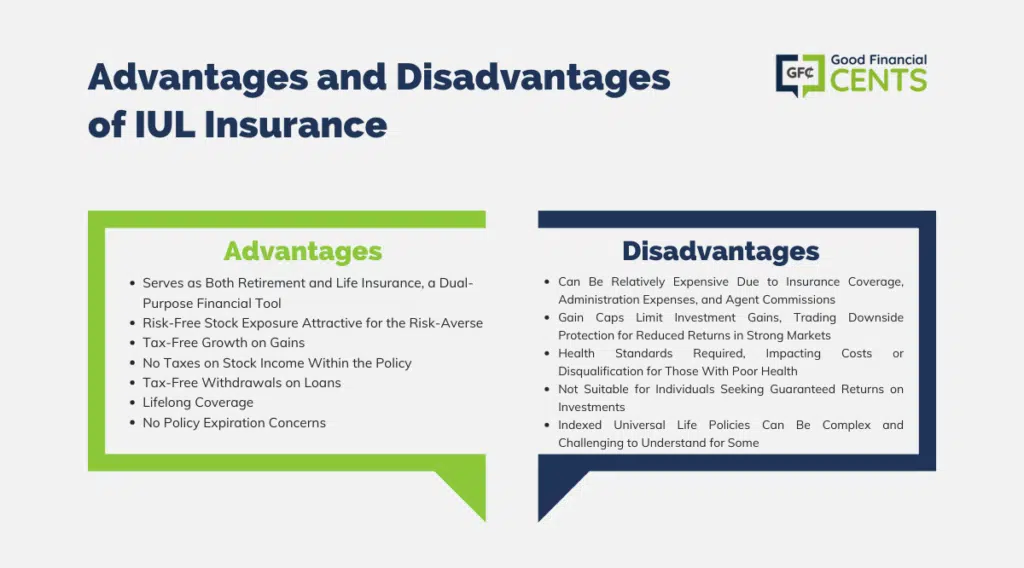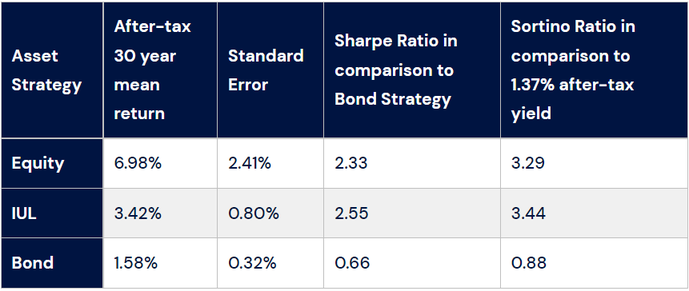All Categories
Featured
Table of Contents
In exchange for making a limited amount of the index's growth, the IUL will certainly never receive much less than 0 percent rate of interest. Also if the S&P 500 declines 20 percent from one year to the next, your IUL will not lose any money value as an outcome of the marketplace's losses.

Discuss having your cake and consuming it too! Envision the rate of interest intensifying on an item keeping that sort of power. So, given every one of this information, isn't it conceivable that indexed global life is an item that would allow Americans to purchase term and invest the rest? It would certainly be tough to say against the reasoning, would not it? Now, do not obtain me incorrect.
A real financial investment is a safety and securities product that undergoes market losses. You are never ever based on market losses with IUL merely since you are never based on market gains either. With IUL, you are not purchased the marketplace, however simply earning passion based on the performance of the market.
Returns can grow as long as you continue to make repayments or keep a balance.
What Is Index Life Insurance
Unlike universal life insurance, indexed global life insurance coverage's money worth makes interest based on the performance of indexed stock markets and bonds, such as S&P and Nasdaq., points out an indexed global life plan is like an indexed annuity that feels like global life.

Universal life insurance coverage was produced in the 1980s when passion prices were high. Like other kinds of long-term life insurance policy, this policy has a cash money worth.
Indexed global life plans offer a minimum surefire rates of interest, additionally referred to as a rate of interest crediting flooring, which reduces market losses. Claim your money value sheds 8%. Many firms give a flooring of 0%, indicating you will not lose 8% of your financial investment in this instance (single premium universal life insurance pros cons). Realize that your cash money worth can decline even with a floor because of premiums and other costs.
Universal Life Policy Vs Term
A IUL is a long-term life insurance plan that borrows from the residential properties of a global life insurance plan. Unlike global life, your cash value grows based on the efficiency of market indexes such as the S&P 500 or Nasdaq.
Her work has actually been released in AARP, CNN Emphasized, Forbes, Ton Of Money, PolicyGenius, and U.S. Information & Globe Record. ExperienceAlani has actually evaluated life insurance coverage and pet insurance provider and has actually composed numerous explainers on travel insurance coverage, credit score, financial debt, and home insurance. She is passionate regarding demystifying the complexities of insurance and other personal money topics so that readers have the info they require to make the most effective money decisions.

Paying just the Age 90 No-Lapse Premiums will certainly ensure the survivor benefit to the insured's achieved age 90 but will not ensure cash money value accumulation. If your client ceases paying the no-lapse guarantee costs, the no-lapse attribute will end prior to the guaranteed duration. If this happens, extra premiums in an amount equivalent to the shortage can be paid to bring the no-lapse attribute back in pressure.
I just recently had a life insurance sales person show up in the remarks thread of a blog post I released years ago about not mixing insurance and investing. He thought Indexed Universal Life Insurance (IUL) was the most effective point considering that cut bread. On behalf of his setting, he published a web link to a write-up created in 2012 by Insurance Representative Allen Koreis in 2012, qualified "16 Reasons Accountants Prefer Indexed Universal Life Insurance Policy" [link no more offered]
Universal Index Life
First a brief explanation of Indexed Universal Life Insurance Coverage. The attraction of IUL is evident.

If the marketplace decreases, you get the guaranteed return, normally something between 0 and 3%. Obviously, because it's an insurance coverage, there are additionally the normal expenses of insurance policy, payments, and abandonment fees to pay. The information, and the factors that returns are so terrible when mixing insurance policy and investing in this certain way, come down to essentially three points: They just pay you for the return of the index, and not the rewards.
Universal Life Insurance For Retirement Income
Your maximum return is capped. If you cap is 10%, and the return of the S&P 500 index fund is 30% (like last year), you obtain 10%, not 30%. Some plans just provide a certain percentage of the adjustment in the index, say 80%. If the Index Fund goes up 12%, and 2% of that is dividends, the modification in the index is 10%.
Include all these results with each other, and you'll discover that long-lasting returns on index global life are pretty darn close to those for entire life insurance policy, positive, but low. Yes, these plans guarantee that the cash money value (not the money that goes to the costs of insurance coverage, certainly) will not shed money, but there is no guarantee it will certainly stay up to date with rising cost of living, a lot less expand at the rate you need it to expand at in order to attend to your retired life.
Koreis's 16 factors: An indexed global life policy account value can never lose cash due to a down market. Indexed universal life insurance coverage guarantees your account value, locking in gains from each year, called an annual reset.
In investing, you earn money to take risk. If you don't wish to take much threat, do not expect high returns. IUL account worths expand tax-deferred like a certified plan (individual retirement account and 401(k)); common funds do not unless they are held within a certified plan. Put simply, this suggests that your account worth gain from three-way compounding: You make rate of interest on your principal, you make rate of interest on your rate of interest and you gain interest on the cash you would certainly otherwise have actually paid in taxes on the interest.
Universal Life Insurance Canada
Certified strategies are a better selection than non-qualified strategies, they still have concerns not offer with an IUL. Investment selections are generally limited to common funds where your account value undergoes wild volatility from exposure to market danger. There is a huge distinction in between a tax-deferred pension and an IUL, however Mr.
You buy one with pre-tax bucks, saving on this year's tax obligation expense at your low tax obligation price (and will certainly commonly be able to withdraw your cash at a lower reliable price later) while you purchase the various other with after-tax bucks and will be compelled to pay rate of interest to obtain your own money if you do not wish to surrender the policy.
Then he includes the classic IUL sales person scare tactic of "wild volatility." If you hate volatility, there are far better ways to reduce it than by getting an IUL, like diversity, bonds or low-beta stocks. There are no constraints on the amount that may be added every year to an IUL.

That's reassuring. Let's consider this for a 2nd. Why would the government placed restrictions on exactly how much you can take into retirement accounts? Maybe, simply maybe, it's since they're such a lot that the federal government doesn't desire you to save way too much on taxes. Nah, that couldn't be it.
Latest Posts
Index Universal Life Insurance Reddit
Universal Term Life
Adjustable Life Insurance Vs Universal Life Insurance